Iranian Intelligence Minister Issues Threats Against Israel
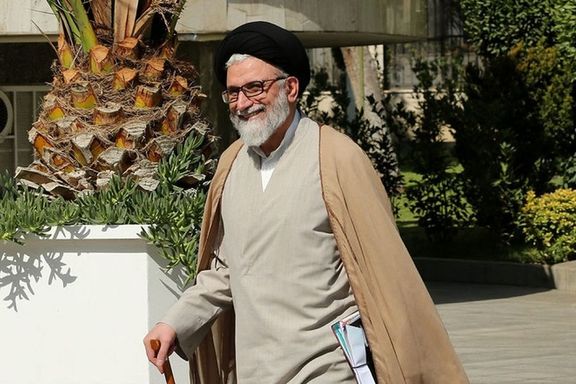
As tensions continue to rise in the region following the recent Hamas attack on Israel, Iranian officials have intensified their rhetoric against the Jewish state.

As tensions continue to rise in the region following the recent Hamas attack on Israel, Iranian officials have intensified their rhetoric against the Jewish state.
Esmail Khatib, the Minister of Intelligence of the Islamic Republic, made statements regarding Hamas' October 7 attack, describing it as a "new historical beginning for the eradication of Israel", claiming it will lead to the collapse of the entire Israeli government.
Khatib's comments reiterate the Iranian regime's long-standing opposition to its archenemy Israel, which he called a "fabricated Zionist regime that had crafted a legendary narrative and a Hollywood image over the years.”
His comments come as Israel's troops on the ground in Gaza rescued its first of the more than 230 hostages held by the group designated by countries including the US, UK and EU.
The young female soldier, Ori Megidish, was taken back to her family in Israel as ground operations stepped up since the weekend, a victory for the Israeli government which is coming under increasing pressure to find the hostages, who are mostly civilians.
As Iranians continue to endure the worst economic times in recent history, the regime's ongoing support for its regional proxies such as Hamas, is a knife in the wound. Hamas alone garners at least $100m a year from Iran in addition to military, technical and logistical support.
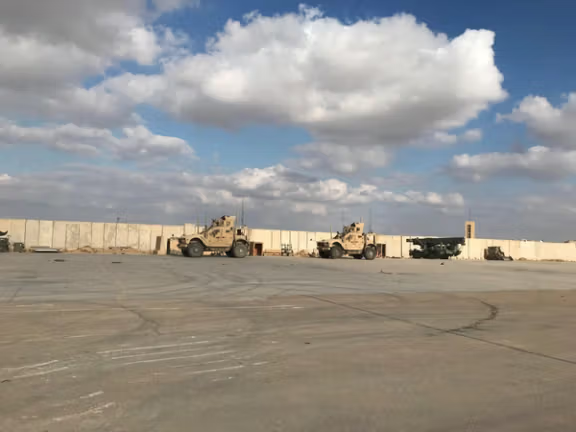
Four Katyusha rockets on Monday fired at Iraq's Ain al-Asad air base which hosts US and other international forces in western Iraq, security sources said.
It was not clear yet if the attack caused any casualties or damage and two army officials said the rockets might have landed away from the base, according to Reuters.
Sunday night, unidentified aircraft conducted multiple air strikes on a 10-truck convoy stationed on the Syrian side of the Iraq-Syria border. It is not clear whether the attack was a second retaliatory US strike, after US warplanes hit Iranian Revolutionary Guard arms depots on Friday.
Rockets were fired from a desert area around 25km (15 miles) north of the base and Iraqi security forces launched a search for the attackers, two security sources said.
There has been an increase in attacks on US forces since the conflict in Israel broke out on Oct. 7 and Iraqi armed groups aligned with Iran threatened to target US interests with missiles and drones if Washington intervened to support Israel against Hamas in Gaza. Iranian proxies have launched nearly twenty rocket and drone attacks at US bases in Iraq and Syria in the past 10 days.
The United States has warned the Iranian regime and its proxy forces across the region not to interfere in the Gaza war and threatened to retaliate if American forces come under fire.
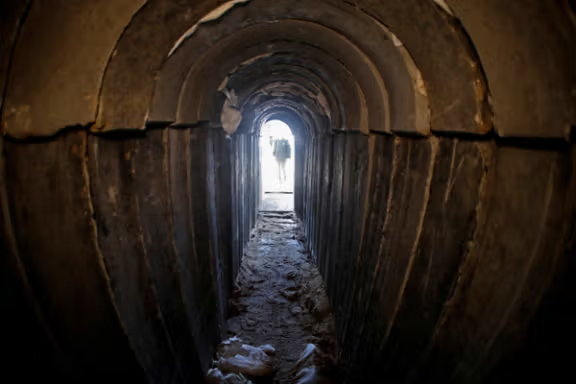
Amid Iran’s relentless sabre-rattling against Israel since it widened its retaliatory offensive against Hamas, the regime's top military commander brags about tunnels underneath Gaza.
Speaking during a military event on Monday, Mohammad Bagheri, the Chief of Staff of Iran's Armed Forces, said Hamas fighters have constructed over 400 kilometers of tunnels, describing them as one the factors that the Islamist militia has survived against Israeli fire. Meanwhile, its cities are buried under rubble as the terror group plants its infrastructure under civilian sites.
Backed by Iran’s hefty financial and logistic support, Hamas Islamist militants attacked Israel from air and ground in a surprise attack on October 7, killing more than 1,400 Israelis and taking hostage over 220 others. Israel has recently extended its retaliatory bombing of the city to ground operation. The Israeli aerial campaign, which has led to the death of thousands of Palestinians, seems inevitable as Hamas has created an underground network of tunnels to move forces, smuggle weapons, infiltrate into Israel, and perhaps keep the hostages. This extends to hiding its key infrastructure under the likes of schools and hospitals.
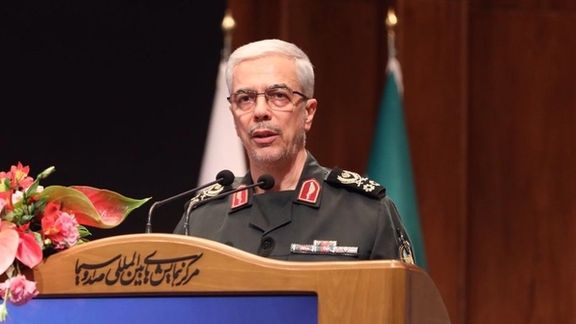
Boasting about the tunnels, Bagheri said motorcycles and cars can pass through the tunnels whose one end is inside the Gaza Strip and the other inside the Israeli territory. He did not talk about why Hamas, who controls the tunnels, would not let civilians use them or take shelter in them, nor did he say why the group does not use its underground network to supply the much-needed food and resources for the Gazans, who have been living under a blockade since 2007. “Hamas fighters prepare for the battle in these tunnels and manage their defensive industries,” he said.
Hamas Official Mousa Abu Marzouk said in a televised interview last week that the tunnels in Gaza were built to protect Hamas fighters from air strikes, not civilians. He added that protecting Gaza civilians is the responsibility of the United Nations and Israel. “We are fighting from inside the tunnels,” he stated.
While there are tunnels acting as shelters for the Hamas militia, there are no shelters for Gaza's civilians under Hamas control.
The Iranian general claimed that Israel would not launch its foreshadowed big ground invasion because it knows it will end in another defeat, glorifying the deadly attack by Hamas that has ruined chances for a regional peace for an unknown future. “Palestinian fighters are ready for a ground assault by Israel, and in the past few nights, we witnessed some glimpses of this defeat. As soon as the internet reconnects in Gaza, we will see images of burning tanks and the killing and capturing of Zionist soldiers."
Referring to the Israeli army, Bagheri said, "That mighty army and unmatched security, power, and splendor of the Zionists collapsed on October 7” in the operation al-Aqsa Flood – the codename for the war Hamas declared on Israel, "a manifestation of Hamas' depth of intelligence and operations."
Suggesting that the group, designated by countries including the UK and US, has enough military hardware and rockets to sustain a long war, he said, “If this bombing continues for one year, once again, the Zionists will be the losers in this field.” While Iran continues to deny having a hand in the war, while international aid groups claim there is no basic food, water and hygiene products in the territory, there is clearly no shortage of rockets.
Also on Sunday, several other Iranian military men and officials praised the tunnels as a means of “passive defense.” Iran’s Interior Minister Ahmad Vahidi, himself a Revolutionary Guard commander, said the tunnel network is a significant factor in Hamas “resistance.” Iran brands its proxy militias across the region as “resistance forces” against global imperialism.
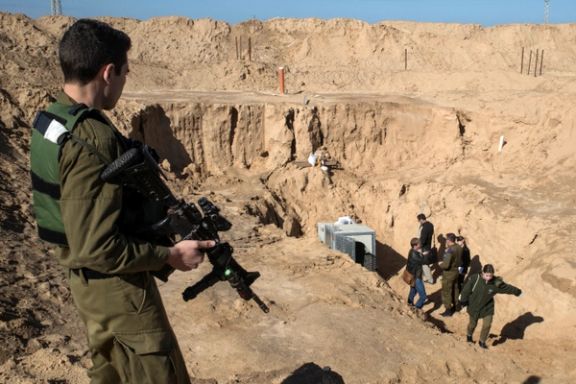
The Palestinian Islamist group has different kinds of tunnels running beneath the sandy 360 sq km coastal strip and its borders -- including attack, smuggling, storage and operational burrows, Western and Middle East sources familiar with the matter said.
What lies in wait for Israeli ground troops in Gaza, security sources say, is a Hamas tunnel network hundreds of kilometers long and up to 80 meters deep, described by one freed hostage as "a spider's web" and by one expert as the "Viet Cong times 10".
While it and other Palestinian groups are secretive about their networks, recently released Israeli hostage, 85-year-old Yocheved Lifshitz, said, "It looked like a spider's web, many, many tunnels," adding: "We walked kilometers under the ground."
The Israeli military said on Friday that Hamas is using Gaza's main hospital, Al Shifa, as a shield for tunnels and operational centers, revealing the complex network of the center. "Hamas has turned hospitals into command-and-control centers and hideouts for Hamas terrorists and commanders," Rear Admiral Daniel Hagari, Israel's chief military spokesman, said.
He showed photographs, diagrams and audio recordings that, he said, showed how Hamas was using hospitals to hide command posts and entry points into the tunnel network. "Hamas terrorists operate inside and under Shifa hospital and other hospitals in Gaza," he said.
With Israel in control of Gaza's air and sea access and 59 km of its 72 km land borders - with Egypt 13 km to the south -- tunnels provide one of the few ways for Hamas to bring in weapons, equipment and people. Its capability for smuggling has earned the Hamas leaders in exile a fortune running into billions as everything that goes in and out is subject to Hamas taxation.
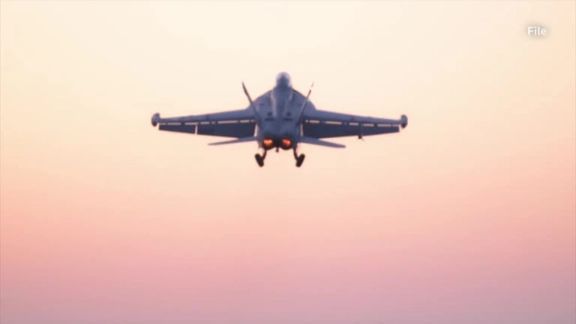
An unidentified aircraft conducted multiple air strikes on a 10-truck convoy stationed on the Syrian side of the Iraq-Syria border on Sunday night.
The information was confirmed by an Iraqi border official on Monday. The convoy had crossed into Syria from Iraq using the Qaim border crossing the day before. The air strikes resulted in the destruction of part of the convoy.
The Qaim border crossing is located near the Syrian town of Abu Kamal, also known as Al Bukamal. It is in close proximity to where the US military had carried out air strikes on the previous Friday. The US strikes targeted two facilities that were being used by Iran's Islamic Revolutionary Guard Corps and affiliated groups. The Pentagon stated that the strikes were a response to recent attacks against US forces in both Iraq and Syria.
On Monday, two sources from Iraqi militia groups reported that on Sunday, unidentified aircraft carried out air strikes on a facility utilized by the militia near Abu Kamal.
According to the sources, the building targeted in the attack had been vacated by militia fighters a day before with no casualties recorded.
Last week, the Pentagon disclosed that American troops in Syria and Iraq had faced multiple attacks from Iranian proxies between October 17 and October 24. Senator Cotton, speaking on Fox News, suggested that the Biden administration should consider the approach taken by the Trump administration when it targeted and killed Qassem Soleimani the IRGC’s Quds Force commander in January 2020.
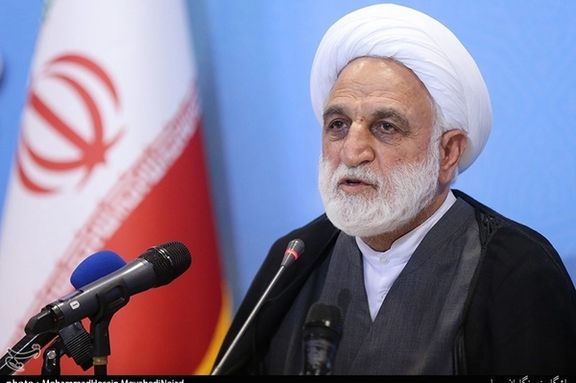
Iran’s judiciary urged law enforcers to begin punishment of opponents of compulsory hijab while awaiting the approval of the contentious Chastity and Hijab bill.
Chief Justice Gholahossein Mohseni Ejei called on the police and the ministry of interior to take immediate measures amid yet more crackdowns while the law is awaiting final approvals from authorities who have cited "ambiguities" in the proposal.
Initially presented by the Judiciary, the Chastity and Hijab bill was later modified by a commission consisting of select members of the parliamentary judiciary and cultural committees, without being debated in the parliament's open session. The modified bill was eventually approved with the addition of more articles.
On September 20, parliament members endorsed the bill with a three-year experimental period and forwarded it for approval to the Guardian Council.
However, last week, the Guardian Council and the Expediency Council criticized the bill, which had been approved by a special parliamentary commission, citing “ambiguities,” and subsequently sent it back to the parliament for clarification.
Anti-hijab sentiment is still high, however. Shargh daily recently conducted a poll, revealing that a significant 84% of respondents expressed their opposition to compelling women to observe the hijab. Of the 12,334 participants in the poll, 84.21% believed that the implementation of the Chastity and Hijab law would not result in an increased hijab compliance among women.t
In September, the United Nations branded the law "gender apartheid".
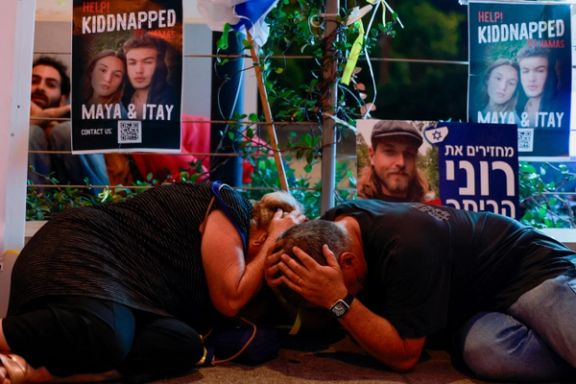
A young soldier of Iranian origin has been named as the latest victim confirmed dead following the Hamas massacre of October 7 in Israel.
In an emotional farewell, Shirel Haeimpour’s grandfather sang a traditional Jewish love song and a wedding song with his Esfahani Persian accent for the young woman who will never get to stand under the traditional canopy, or ‘chuppah’.
From the town of Rishon Lezion, Shirel’s loved ones gave moving speeches about her as Israel mourns the more than 1,400, mostly civilians, murdered on the day now considered the most deadly day for Jews since the Holocaust.
Another more than 230 have been taken hostage to Gaza, including babies and children.

It was her last weekend as a soldier in the mostly female base near Kibbutz Nahal Oz, one of the many villages where civilians were slaughtered and homes destroyed by the thousands of Hamas militants who invaded Israel by air, land and sea.
The girls’ duty was to watch the country’s most active border. The base had a policy of 'you see, you shoot’, the Gaza border a constant threat since Hamas took over control of the strip.
In a chilling recollection, her boyfriend Ariel Ben Uri, spoke of her constant fears that one day, Hamas would break through and invade, feeling that both the soldiers and the civilians around them were not safe from terrorist infiltration. “You were right,” he said, fighting back tears.
The youngest daughter of four, her brother Barak spoke of her bravery as she leapt out of bed as the tragedy unfolded to go straight to the emergency room. Hamas drones had blacked out the cameras meaning there were just minutes for the girls to alert others of an imminent attack.
“You saved lives and chose to help,” he said, speaking through his tears at the ceremony in Rishon Lezion, south of Tel Aviv.
News of her death was felt by the Iranian diaspora. Karmel Melamed wrote on X: “As an Iranian American I weep for Shirel Haeimpour, an innocent Iranian-Israeli young woman slaughtered by Hamas barbarians.
“She came from Isfahani (Esfahani) Jewish roots which are ancient. Just as we mourn the loss of Armita in Iran, we also mourn the loss of Shirel in Israel,” referring to a 16-year-old schoolgirl, who was pronounced dead after spending four weeks in coma in Tehran, following a scuffle with hijab police.
Among the murdered were hundreds of dual citizens from countries including France, the UK, and the US. Dozens of local Arabs and Bedouins were also murdered.
The hostages now include around 30 nationalities, Israelis, dual-nationals, foreign workers and tourists.
Hamas has demanded the release of 6,000 prisoners in return for the hostages, though it claimed recently 50 have died in Israeli airstrikes on the strip.
In 2011, Israel released over 1,000 Palestinians from its jails in return for one Israeli soldier, Gilad Shalit. In a bitter twist, many of them, including Hamas' leader in the Gaza Strip, Yahya Sinwar, ended up being among those who masterminded and executed the surprise attack on October 7.
Experts warn that the latest situation would set a dangerous precedent not only to Hamas but to Israel’s archenemy Iran. In August, the Biden administration agreed to unblock $6b of frozen Iranian funds in south Korea in exchange for five dual-national US-Iranians held hostage in Iran. Many warned at the time that the “largest ransom in history” would embolden the Iranian regime and other would-be hostage takers.
In the meantime, Israel has vowed to continue its ground invasion of Gaza until both Hamas is destroyed and the hostages are brought home, as the war enters its fourth week.